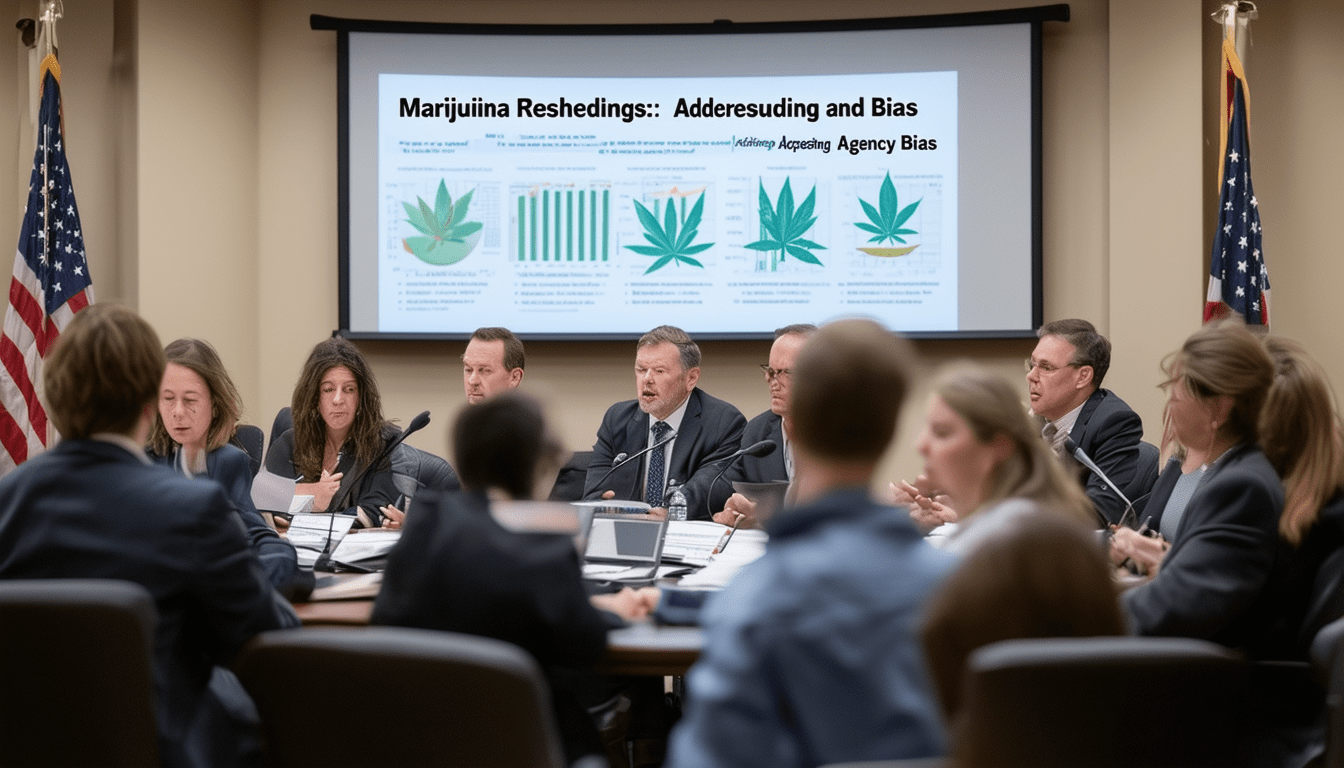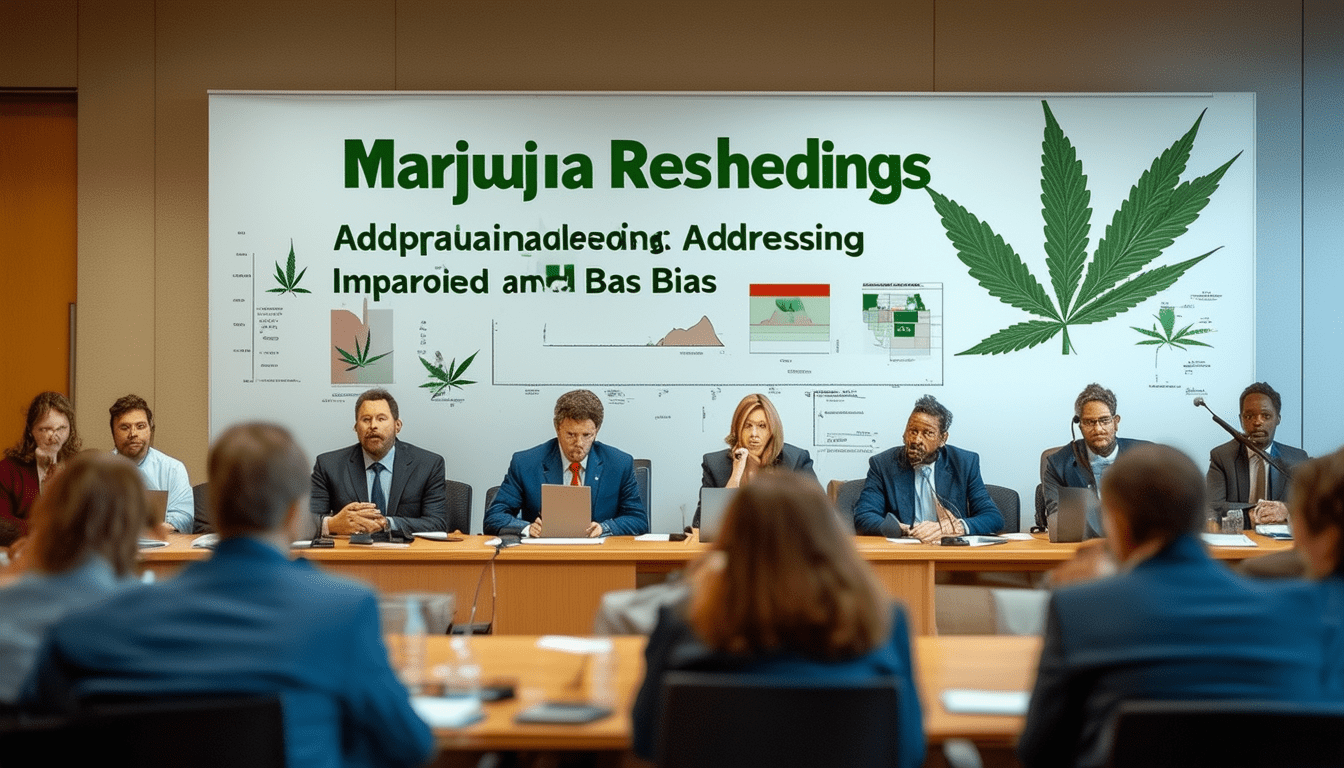Academic Challenges DEA Marijuana Rescheduling Hearings, Citing Claims of Impropriety and Agency Bias
|
IN BRIEF
|
The ongoing debates surrounding the rescheduling of marijuana by the Drug Enforcement Administration (DEA) have prompted significant academic scrutiny, particularly concerning the procedural integrity of upcoming hearings. A recent lawsuit has highlighted numerous claims of impropriety and agency bias, asserting that the DEA has violated various laws in its approach to these proceedings. These allegations not only question the legitimacy of the DEA’s decision-making process but also underscore the importance of transparency and accountability in federal regulatory actions affecting cannabis policy. As the hearings approach, the intersection of legal frameworks, tribal consultation, and small business considerations becomes a focal point for understanding the implications of the DEA’s actions.

The ongoing discussion surrounding the rescheduling of marijuana has reached a pivotal point, with recent lawsuits highlighting deep-seated issues regarding the procedures adopted by the Drug Enforcement Administration (DEA). A researcher from Panacea Plant Sciences has filed a lawsuit in federal court, alleging the DEA’s actions violate multiple laws concerning the upcoming hearings intended to evaluate the Biden administration’s cannabis rescheduling proposal. These claims of impropriety and bias not only question the integrity of the hearing itself but also shed light on broader systemic issues within the agency.
Claims of Procedural Violations
In his court filing, David Heldreth, the CEO of Panacea Plant Sciences, outlines four critical reasons for halting the DEA’s administrative hearing scheduled for December 2. These include alleged violations of a Clinton-era executive order mandating federal agencies consult with tribal entities on rules that directly impact them. Additionally, he cites potential breaches of the Regulatory Flexibility Act and the Small Business Regulatory Enforcement Fairness Act. These laws are put in place to ensure that the voices of smaller stakeholders are heard, particularly those from underrepresented communities.
Retaliation Allegations
One particularly concerning aspect of the lawsuit is the assertion that the DEA’s decision to exclude Panacea from the hearing appears to be retaliatory in nature. Heldreth describes the exclusion as a “punishment” for the company challenging the DEA’s proposed regulations concerning psychedelic substances. This accusation raises serious concerns about the agency’s impartiality, especially when it comes to matters that intersect scientific research and public health policy.
The Role of Tribal Consultation
Heldreth emphasizes the importance of upholding Native American sovereignty during his legal challenge. The timing of the lawsuit, coinciding with Native American History Month, underscores the need for the federal government to adhere to its own regulations regarding tribal consultation. The failure to do so casts doubt on the legitimacy of the administrative hearing process and highlights larger questions about representation and inclusion in impactful decision-making.
Agency Skepticism and Decision Delays
The DEA has been under scrutiny for its approach to scheduling hearings related to marijuana rescheduling. While an initial hearing is slated for December, DEA Chief Administrative Law Judge John Mulrooney recently indicated that the information provided by the agency regarding witnesses was insufficient, therefore prompting a potential delay in the decision-making process. This reflects a broader sentiment within the cannabis advocacy community that the DEA may not be adequately supportive of the reforms needed to advance marijuana research and usage.
Political Implications
Political figures are also weighing in on the challenges associated with the rescheduling process. Vice President Kamala Harris, in recent remarks, hinted at the governmental bureaucracy that may be contributing to the delays in proceeding with marijuana reforms. Harris’s frustrations mirror a wider concern within a bipartisan context, where figures from both sides of the aisle have voiced support for cannabis legalization as evidenced by the ongoing stances of politicians such as Donald Trump. The intersection of politics and cannabis regulation further complicates the academic and procedural issues at play.
Conclusion of Legal Actions
The lawsuit filed by Heldreth seeks an injunction to pause any further administrative proceedings regarding marijuana and the upcoming hearings until adequate resolutions to these alleged violations are made. As the legal landscape evolves, the implications of these challenges could have profound impacts, not only on federal drug policy but also on the future of cannabis research and advocacy.
Comparative Analysis of Academic Challenges in DEA Marijuana Rescheduling Hearings
| Aspect | Details |
| Legal Allegations | Claims of violations of executive orders and regulatory laws. |
| Hearing Schedule | Initial hearing set for December 2, post public comment period. |
| Exclusion from Hearing | Notable organizations, including Panacea, were excluded from participation. |
| Potential Retaliation | Exclusion viewed as punitive for challenging agency decisions. |
| Tribal Consultation | Accusations of non-compliance with tribal consultation requirements. |
| Regulatory Violations | Alleged breaches of the Regulatory Flexibility Act. |
| Administrative Judge Ruling | Requests for additional details on witness selection. |
| Impact on Future Hearings | Concerns that decisions could be delayed until a new administration. |

Academic Challenges DEA Marijuana Rescheduling Hearings
The landscape of cannabis regulation is increasingly complex, especially with the ongoing marijuana rescheduling hearings by the Drug Enforcement Administration (DEA). Recent legal actions have prompted scrutiny and raised critical questions regarding the fairness and legality of the process, notably targeting claims of impropriety and bias within the agency’s decision-making framework.
Recent Lawsuit Highlights Regulatory Concerns
A notable case has emerged, spearheaded by cannabis and psychedelics researcher, David Heldreth, founder of Panacea Plant Sciences. He has filed a lawsuit in federal court alleging that the DEA violated multiple laws in its management of the rescheduling hearings. He contends that these violations warrant judicial intervention to halt the proceedings until clarified. The lawsuit underscores significant discontent regarding how the DEA conducts its hearings, especially in relation to the public’s participation and consultation with relevant stakeholders.
Claims of Impropriety in the Hearing Process
Heldreth’s legal complaint outlines several procedural grievances, including non-compliance with a Clinton-era executive order that mandates federal agencies engage with tribal entities on rulemaking decisions affecting them. This oversight raises questions about the legal integrity of the rescheduling process, suggesting that such actions display a clear lack of adherence to established regulations.
Allegations of Agency Bias
Moreover, the lawsuit outlines allegations of bias, with Heldreth suggesting that the pharmacological expertise of Panacea Plant Sciences was intentionally overlooked as a punitive measure for their prior challenges to DEA policy. Such isolation from the proceedings raises alarms about potential retaliation against those who oppose the agency’s regulatory direction, compromising the integrity of the rescheduling hearings.
Impacts on Public Participation
The case also reflects broader implications for public engagement in the regulatory process surrounding cannabis. It exposes a concerning trend where participants advocating for responsible cannabis reform may feel marginalized or silenced, limiting the diversity of viewpoints essential for a balanced discussion. The exclusion of credible participants undermines the legitimacy of the hearing results and tarnishes the reputation of the DEA as a fair adjudicator.
Context of the Hearing Delays
The initial hearings are scheduled to take place on December 2, yet they follow a drawn-out period of public commentary and increasing skepticism towards the DEA’s operational methods. Recent statements from political figures, including Vice President Kamala Harris, indicate frustration with federal bureaucracy surrounding these essential rescheduling efforts. Such statements fortify claims that administrative hurdles are fostering delays and inefficiencies in implementing necessary reforms.
Future Perspectives on Cannabis Regulation
As the legal landscape surrounding cannabis continues to evolve, the determination of fairness and transparency in the DEA’s hearing processes will play a critical role. Stakeholders remain vigilant, recognizing that the outcome of these hearings will not only impact the regulatory framework for cannabis but also set a precedent for how federal agencies handle complex issues with public interests at stake.
Key Issues in DEA Marijuana Rescheduling Hearings
- Legal Violations: Allegations of breaking regulations concerning tribal consultations and federal guidelines.
- Exclusion from Hearings: Claims of retaliatory actions against specific researchers and organizations, impacting their participation.
- Agency Accountability: Calls for transparency regarding DEA’s decision-making process in rescheduling cannabis.
- Public Commentary Impact: Criticism of how feedback from public comments is integrated into the hearing outcomes.
- Administrative Delays: Extended timelines leading to skepticism about the DEA’s commitment to cannabis rescheduling.
- Scientific Review Insufficiencies: Concerns over the robustness and adequacy of the scientific rationale guiding marijuana classification.
- Impact on Research: Fear that current classifications hinder important scientific studies related to cannabis and other compounds.
The ongoing legal disputes surrounding the DEA marijuana rescheduling hearings have raised significant concerns about agency propriety and bias. A recent lawsuit filed by a cannabis and psychedelics researcher highlights these issues, asserting that the DEA has failed to adhere to legal requirements while underlining potential retaliatory actions against those challenging the agency’s decisions. This article delves into the academic challenges arising from these hearings, addressing claims of impropriety that warrant a call for introspection and reform within the regulatory framework.
Legal Violations and Hearing Procedures
Central to the allegations put forth is the claim that the DEA violated multiple laws during the organization of its hearings regarding the rescheduling of cannabis. For instance, an executive order from the Clinton administration mandates that federal agencies consult with tribal entities when their rulemaking decisions have an impact on indigenous communities. Failure to abide by these protocols raises significant ethical concerns regarding the jurisdiction’s respect for Native American rights and sovereignty.
Furthermore, the implications of the Regulatory Flexibility Act and the Small Business Regulatory Enforcement Fairness Act have been disregarded in these proceedings. These laws aim to ensure that agencies consider the effects of their regulations on small entities, a category into which numerous cannabis-related organizations fall. Ignoring these regulations not only undermines fair representation but also propels a narrative of exclusion and bias that discredits the DEA’s objectives.
Claims of Retaliatory Actions
The exclusion of Panacea Plant Sciences from the upcoming hearings is particularly alarming. The company, which has actively fought against the DEA’s prior regulatory actions, perceives this exclusion as retaliatory—punishment for its stance and engagement in advocacy. Such actions pose a significant threat to the integrity of the hearing process, hindering diverse voices and perspectives that are crucial for an inclusive dialogue on cannabis regulation.
Allegations of a “punishment” mindset point towards a regulatory environment that is not only problematic but also detrimental to the scientific community. It raises fundamental questions regarding whether the DEA is genuinely interested in hearing from all stakeholders or merely seeks to control the narrative surrounding cannabis policy reform.
Implications of Agency Bias
The idea of agency bias further complicates the legitimacy of the rescheduling hearings. Concerns are particularly amplified by recent developments that indicate a lack of transparency and accountability in the selection of witnesses. Unfair participation criteria can skew the resulting policies and reinforce existing biases within the federal system. Thus, systemic biases not only detract from a thorough evaluation of the evidence but also hinder a balanced exploration of the potential benefits of cannabis legalization and rescheduling.
This bias is evident in public comments from various political figures who have acknowledged agency delays as a significant barrier to progress. Such sentiments reflect a growing awareness that perhaps the bureaucratic inertia surrounding marijuana rescheduling is rooted in a reluctance to shift the status quo, rather than an inability to process information effectively.
The Importance of Procedural Integrity
To safeguard the legitimacy of future hearings, it is crucial that the DEA adhere to procedural integrity. This includes ensuring that adequate channels for public participation and comment are available, and that all interested parties—including those representing marginalized communities—are given a fair opportunity to contribute during hearings.
Failure to rectify these issues would not only undermine the rescheduling process but could also cement a perception of the DEA as an agency unwilling to facilitate constructive discourse surrounding drug policy reform. Such actions ultimately hamper attempts to create a rational, science-based approach to cannabis regulation that considers the multifaceted implications of drug policy.
Frequently Asked Questions about DEA Marijuana Rescheduling Hearings
What is the primary issue being raised against the DEA regarding the marijuana rescheduling hearings? The primary issue revolves around allegations of impropriety and bias in the DEA’s process for holding hearings to reconsider the rescheduling of cannabis from Schedule I to Schedule III under the Controlled Substances Act.
Who has filed a lawsuit against the DEA and what are the main allegations? David Heldreth, founder and CEO of Panacea Plant Sciences, has filed a lawsuit, alleging that the DEA violated multiple federal laws, including failing to consult with tribal entities as required under a Clinton-era executive order.
What specific laws does the complaint claim the DEA has violated? The complaint cites violations of the Regulatory Flexibility Act, the Small Business Regulatory Enforcement Fairness Act, and the requirement for consulting tribal entities on rulemaking decisions that affect them.
Why was Panacea Plant Sciences excluded from participating in the DEA hearings? Heldreth claims that their exclusion appears retaliatory due to their previous challenges against the DEA’s attempts to ban certain psychedelic compounds, labeling it as punishment for their legal actions.
What actions has the DEA taken in response to the lawsuit and hearing proceedings? The DEA has scheduled an initial hearing for December 2 but has faced scrutiny as a DEA administrative law judge indicated that the information provided about witnesses was insufficient and requested additional details.
How does Vice President Kamala Harris view the delay in the marijuana rescheduling process? Vice President Harris has expressed frustration with federal bureaucratic processes that contribute to delays, including those involving the DEA, indicating a desire for expediency in addressing the marijuana rescheduling issue.
What are the implications if the court rules in favor of the lawsuit? If the court grants the injunction sought, it could impede the DEA from proceeding with any further administrative actions or scheduling related to marijuana until the legal issues are resolved.
What significance does Heldreth place on the timing of the lawsuit? Heldreth suggests that the timing is particularly poignant during Native American History Month, emphasizing the importance of tribal consultation and the upholding of Native American sovereignty in regulatory processes.





Post Comment